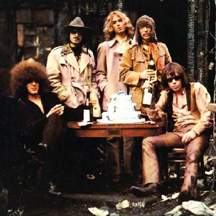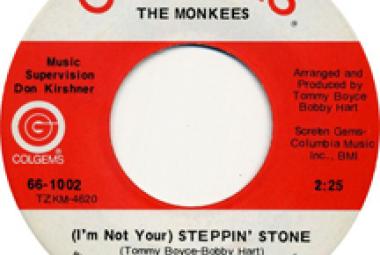Steppenwolf is a Canadian-American rock group that was prominent from 1968 to 1972. The essential core of Steppenwolf was John Kay, Jerry Edmonton, his brother Dennis Edmonton, and Goldy McJohn. Steppenwolf sold over 30 million records worldwide, releasing eight gold albums and twelve Billboard Hot 100 singles of which six were Top 40 hits, including three Top 10 successes: “Born to Be Wild”, written by Dennis Edmonton (credited as Mars Bonfire), “Magic Carpet Ride”, and “Rock Me”. (More from Wikipedia)
As it happens, I have a live album by Link Wray from the same time period as the original Link Protrudi and the Jaymen, called Live in ’85. It is a little sad to hear all of the chatter by the audience in the background, and seeing him having to resort to covering Bruce Springsteen (“Fire”) and Steppenwolf (“Born to be Wild”).
(February 2013)
* * *
My home town of Winston-Salem, North Carolina has a reputation as being kind of prudish. Their feud with the rock band Steppenwolf is rather well known in rock circles, as the City fathers attempted to keep the band from singing “goddamn” when they performed their hit song “The Pusher” there. (Lead singer John Kay obliged, though the concert crowds always enthusiastically filled in the offending word).
(March 2013)
* * *
That brings me back to the original topic at hand: If Germans and Dutch could fluently speak the language of rock and roll, how much easier is it for Canadian rock musicians to blend in seamlessly with the larger rock world. Canadian rock stars are common, even if not everyone knows that they are Canadian: Neil Young is a long-time favorite of mine who is from Toronto, Ontario; the Guess Who, from Winnipeg, Manitoba, had numerous hits in the 1960’s and 1970’s and had a spinoff band as well called Bachman-Turner Overdrive, with lead singer Burton Cummings also having a lucrative solo career; Steppenwolf evolved from a Canadian rock band called the Sparrows (Mars Bonfire, a former Sparrow wrote their massive hit “Born to be Wild”); and the band that Janis Joplin headed for her final album, Pearl (after she left Big Brother and the Holding Company), the Full Tilt Boogie Band is from Stratford, Ontario. Even the seemingly quintessential American band called The Band was actually composed of Canadians with the exception of Levon Helm; they once released a single under the name the Canadian Squires.
(April 2013)
The writer of the first hit song for Steppenwolf, “Born to be Wild” is listed as Mars Bonfire; but that is clearly no one’s birth name. It is not even the man’s first stage name; when he was a member of the predecessor band to Steppenwolf, the Sparrows, he used the name Dennis Edmonton. He was born Dennis McCrohan; he and his brother Jerry Edmonton (born Gerald McCrohan), who was also in the Sparrows, had changed their surnames at the same time. Interestingly, Mars Bonfire had his song shopped to other bands before Steppenwolf got their shot at it; one was a Los Angeles psychedelic rock band called the Human Expression. Front man Jim Quarles chose one of Bonfire’s songs, “Sweet Child of Nothingness” as the “A” side for the band’s third single; but he wasn’t impressed with “Born to be Wild” and passed on that song.
* * *
The Human Expression had a chance to record “Born to be Wild” before the song was made available to Steppenwolf, but the band wasn’t impressed with that song and chose another Mars Bonfire song instead, “Sweet Child of Nothingness”.
(September 2013)
* * *
“Rollin’ Stone” by Muddy Waters is a bridge from the raw blues of Robert Johnson directly to rock and roll; while it is basically a straight blues song, there are startling changes in the beat and cadences over the course of “Rollin’ Stone”. Within the blues world, it is a direct antecedent to Muddy Waters’ 1954 recording of the Willie Dixon song “I’m Your Hoochie Coochie Man” (Steppenwolf included “Hoochie Coochie Man” on their 1968 debut album Steppenwolf, among numerous other covers by various rock musicians), Bo Diddley’s “I’m a Man” (1955), and Waters’ answer “Mannish Boy” (also in 1955). I suppose that Bo and Muddy had a pretty good rivalry going back then, but on several occasions, I saw a performance of “I’m a Man” by Muddy Waters in later life on a series of films on TV called Living Legends of the Blues – that rendition even leaves the cover of “I’m a Man” by the Yardbirds in the dust.
This month’s Under Appreciated Rock Band of the month is the Human Zoo, a band having numerous connections to a truly legendary band called the Human Expression, one of the garage rock and psychedelic rock bands where I wrote up the Wikipedia article many years back. The Human Expression was from Orange County, California and formed in 1966. The father of one of the bandmembers (who was also one of their songwriters), Jim Foster served as the band’s manager. They released only three singles on Accent Records in 1966 and 1967, with “Optical Sound” being a regional hit. The band had the opportunity to record “Born to be Wild” before Steppenwolf when they were presented with two demos from songwriter Mars Bonfire; bandleader Jim Quarles selected “Sweet Child of Nothingness” as the “A” side of their third single over the future 1968 hit song (and he has a point if you ask me).
(July 2015)
* * *















